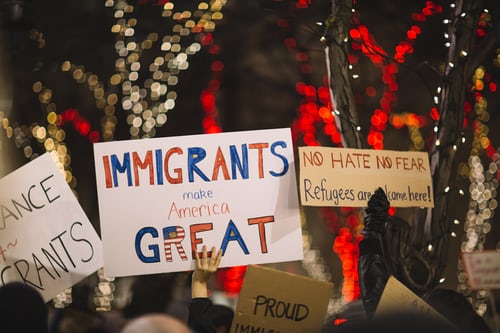With the Trump administration belligerent about reducing H1B visas as well as revoking the work permits of dependent spouses, many Indian immigrant wives fear losing their hard-won careers.
Many migrant Indian women in the US live in less than ideal circumstances – not the dream life that NRIs are considered to have . Many are unable to work and rely on their spouses for most all their needs.
Women with the H4 visa in the United States are financially dependent on their spouses, which can cause depression and much more. What’s more, the H4 visa policy can lead to the breakup of families, a sense of loneliness and worthlessness amongst women and more.
In this article, I will discuss the implications of the H4 visa on Indian women living in the US, most of whom are reliant on their spouses for most basic needs.
Before I start discussing these implications, let me share some background information on the H1B as well as dependent visas, and related documents that affect Indian migrant women today.
The H1B visa, and the H4 that rides on it
The H1B visa is a visa given out to people who have at least a Bachelor’s degree that equips them to perform specialty occupations. In order to receive this visa, the employer must offer the applicant a job and upon accepting, this employer applies for the applicant’s H1B visa.
At present, about 65,000 of these visas are issued per year, and they last for six years. The applicant can then extend the period they have this visa by increments of up to three years. Workers with H1B can only legally work for the employer that applied for the license on their behalf. Working for any other employer is considered illegal. However, the H1B visa can be transferred to another employer.
H1B holders and their families are eligible to seek application for green cards, own a car or home , go on vacation, invest in the stock market – in short, do pretty much most things as part of their daily lives.
The H4 visa is a visa issued to those people who are dependent on a H1B visa holder. This includes the spouse of the visa holder and any children under 21. 70% of H1B visas are granted to Indian nationals, meaning many of the people with the H4 visas are Indian women.
What you can and cannot do with a H4 visa
With an H4 visa a person can get a driver’s license, pursue education, open bank accounts, become eligible for an ITIN (Individual Taxpayer Identification Number). However, a H4 EAD is required for a dependent to work in the US.
The H4 EAD is a document granted to dependent H4 holders that allows them to work in the US. It was established in 2015 by the Obama Administration. This document opportunity was created because many skilled H1B workers were moving back to their home countries because their spouses were limited and could not work. This created incredible disruptions in many US business, so the H4 EAD document was created.
90% of H4 EAD holders are Indian women, meaning they were affected largely by the creation of this document. However, not everyone can apply for H4 EAD.
Who can get an H4 EAD?
To apply for H4 EAD, the independent H1B holder has to fit into one of these categories.
- the H1B visa holder is the principal of an approved i-140 form, the form that alien workers use to petition for residence in the United States.
- The H1B visa holder has been granted H1B status through sections 106 a and b of the American Competitiveness in the Twenty-first Century Act of 2000 as amended by the 21st Century Department of Justice Appropriations Authorization Act (AC21).
Number two might seem like a lot of words, so let me break it down for you. The AC21 allows foreign nationals to change their jobs before obtaining a green card, and allows H1B visa holders to extend their stay in the US beyond six years. Section 106 states that the H1B holder can increase their stay in the US by one year increments. To receive an H4 EAD document in this situation, the H1B independent has to be into their extended period of time after six years of original work. If the H1B visa owner fits into one of these two categories, then the H4 holder is eligible to apply for a H4 EAD.
With the H4 EAD, unlike the H1B visa, the applicant is allowed to work in any field for any employer. The applicant can work either full or part time without worrying about the status of their visa. The H4 EAD applicant can keep their document as long as the independent keeps their H1B and meets the above criteria. The applicant does not need to have a job offer to apply for this document.
But…the H4 EAD faces uncertainty
However, many Indian women are still unable to work or are in fear of their documents being revoked.
Firstly, with the institution of the Trump Administration, the H4 EAD document is on its way to being revoked. The justification for this is that the Administration believes that the H4 EAD workers are taking jobs away from many Americans. They believe if they revoke the EAD, then more Americans will be able to find work. There is no certain date or even knowledge that it will be revoked for sure, but it is enough to instill fear into the minds of many Indian women.
The House of Representatives now is majority Democrat, and these democrats have written a bill to save the H4 EAD, which has been dormant for some time now. Without interruption, about 8-10 months from now the H4 EAD will be revoked. But because of the house majority, there is always a chance it could be overturned.
Senators Kamala Harris (D, CA) and Kirsten Gillibrand (D, NY) wrote a letter to the Dept. of Homeland of Security detailing why they believe the EAD should not be revoked. In their letter, they state that “Rescinding the H-4 rule will result in significant personal hardship to women who will be forced to abandon their professional careers.”
It gives H4 EAD holders some hope that senators are fighting for their right to continue working in the US. Secondly, the Trump Administration proposed a 10% decrease in H1B visas allotted per year, which could affect many Indian migrant families and the IT industry greatly. This reduces the profitability of IT companies in the US, which affects their workers, many of which are on the H1B visas. This affects the H4 holders because it causes uncertainty about their future in the US.
Remember, the H4 EAD wife needs the husband to ‘approve’ her work
Besides this uncertainty, it’s important to note that many women in bad home situations cannot work in any case, even if eligible for an H4 EAD. The application for a H4 EAD has to be approved by the H1B independent. For many Indian women who live in abusive or sexist households where the husband does not believe his wife should work, this reduces any opportunity they have to work.
In a country where not much walking is done, and cars dominate society, a woman without a job can end up as a woman confined to the house. These long days of boredom can lead to worse things, like depression, anxiety and more.
Often, H1B visa holders are unsure about applying for the extension after six years, and therefore overstay their visa in the country. This essentially makes them illegal immigrants in the country. Without the proper paperwork, people in the US cannot get jobs. As an illegal immigrant, a woman would receive close to no job opportunities and would have to remain in the place of stay. This can be a harrowing experience, as illegal immigrants often stay in areas where they are not allowed, so every day comes with the fear of being evicted.
For many women whose husbands have passed away or women who have left an abusive home, they cannot return to India as they may not have family support back home. Because of this, they remain in the US illegally, without a H1B independent and therefore on their own with no job. Especially with the Trump Administration’s new crackdown on illegal immigration, deportation is an imminent threat that hangs over the heads of many Indian women in the US today.
In the end, the crackdown on immigration, the possible reduction of H1Bs and H4 EADs, and the fear of being confined to home constantly hangs over the heads of many Indian women living in the US today.
This post was originally published on www.womensweb.in . Feel free to check out women’s web for similar posts. This post was originally created in June 2019.




